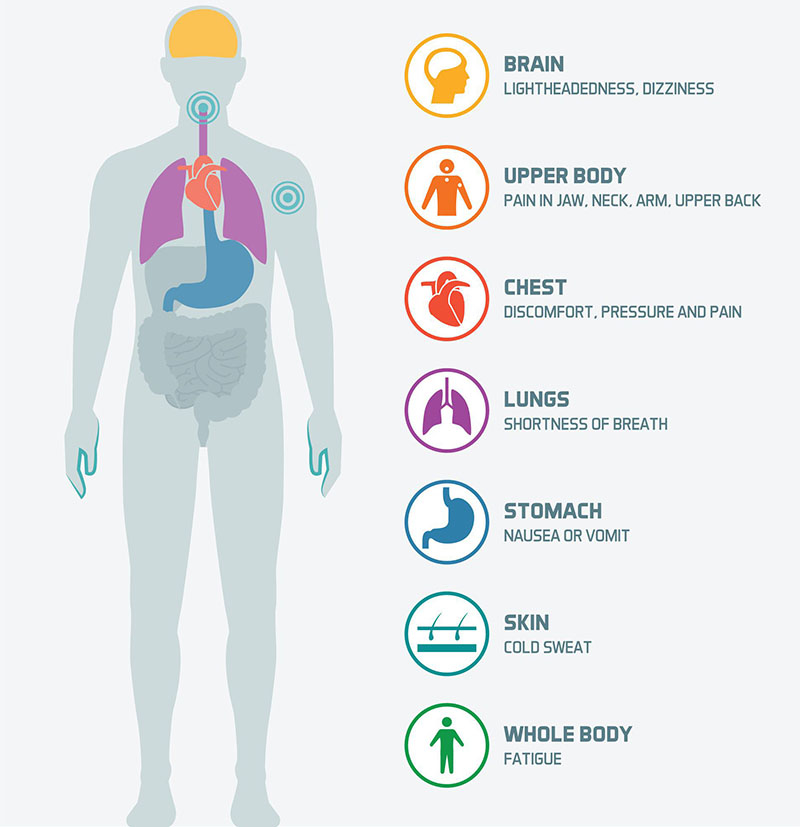
Steinhoff is most worried when someone complains of chest pain during exertion as well as feeling lightheaded. If you are worried about.

Burning in or near your chest.
When to worry about chest pains. Chest pain is an important symptom to recognize because chest pain can be a sign of heart attack. And while having chest pain does not necessarily mean you are having a heart attack and in fact most people who go to the emergency room with chest pain are not having a heart attack chest pain is nevertheless not something to ignore. You should be concerned about chest pain if you have severe pain pressure crushing or squeezing in the chest that lasts more than a few minutes pain that moves into the neck left shoulder arm or jaw or pain associated with breaking out in a sweat or feeling like you are going to pass out.
This can be a medical emergency. When to worry when to relax. As a cardiologist Dr.
Steinhoff is most worried when someone complains of chest pain during exertion as well as feeling lightheaded. Assuming that someone is not profoundly anemic Id be concerned that a significant portion of the heart was not. The chest pain of pericarditis is usually sharp and stabbing.
It can radiate to the back neck or arm. The pain may worsen when taking a deep breath or lying flat and lessen when leaning forward. Chronic Recurrent or Non-Acute Symptoms.
If your chest pain is something youve had before your doctors main concern probably will be whether you have angina. Angina is usually caused by typical CAD but can also be produced by less common cardiac conditions such as coronary artery spasm or cardiac syndrome x. One of the most frightening anxiety symptoms is chest pain.
Thats because chest pain is associated with serious heart problems leading many to worry about their health. Yet it is common for chest pain to actually be a symptom of anxiety. Chest pain is an indicator of a possible heart attack but it may also be a symptom of another condition or problem.
Chest pain isnt something to shrug off until tomorrow. It also isnt something to diagnose at home. If you are worried about.
Chest pain is a symptom of a pulmonary embolism. A pulmonary embolism is when a blood clot forms and blocks the flow of blood to the lungs. This can be dangerous and lead to death.
Pneumonia is a well-known illness and can be dangerous or debilitating if left untreated. According to Kaloostian chest pain or pressure can similarly present before an asthma attack when you have pneumonia or when a clot plugs blood vessels in your lungs. Burning in or near your chest.
A digestive system issue can produce chest pain that typically feels like burning or tightness. Chest pain can be a frightening thing especially if youve had heart problems in the past. Not all chest pain is something to worry about though.
Lets take a look at three common types of chest pain that may be a symptom of a different issue thats not heart-related. Chest pain is never something you should ignore. If you are experiencing it and dont know the cause it is always best to seek immediate medical attention.
However while chest pain can be an indication of a heart attack it can also be caused by a wide variety of other less serious conditions. 1 Chest discomfort in the middle or toward the left side of the front of your chest that is usually described as a pressure or squeezing not actual pain. Classically it can feel like an elephant sitting on my chest or a band wrapping around the chest although is not always this dramatic in presentation.
Chest pain symptoms Possible cause. Starts after eating bringing up food or bitter tasting fluids feeling full and bloated. Starts after chest injury or chest exercise feels better when resting the muscle.
Chest sprain or strain. Triggered by worries or a stressful situation heartbeat gets faster sweating dizziness. Chest pain from a pulmonary embolism may be sudden and sharp and worsen when you inhale or cough.
Other symptoms may include lightheadedness anxiety rapid heartbeat and shortness of.